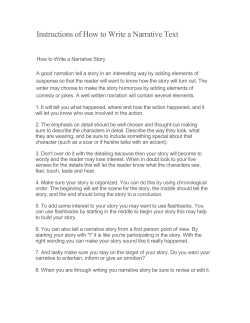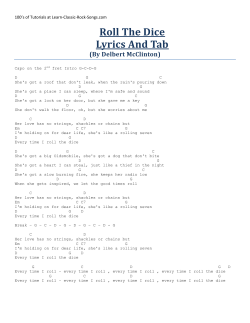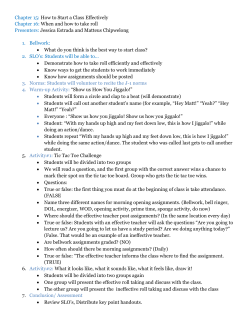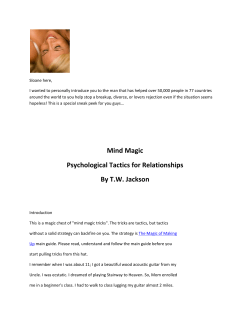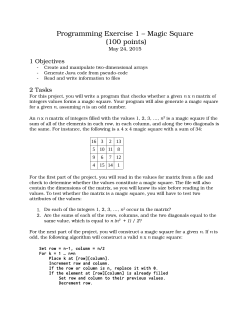
HOW TO BUILD A GURPS CHARACTER! CREATING YOUR CHARACTER ATTRIBUTES
HOW TO BUILD A GURPS CHARACTER! CREATING YOUR CHARACTER ATTRIBUTES Each player needs a character to take part in the story. Depending on the genre that your group wants to play, the character could be a Viking warrior, an interstellar smuggler, a modern day assassin, or even a vampire with a heart. No matter what universe you decide to play in, each character has the same set of attributes. • • • • Strength (ST) - Strength measures physical power and bulk. It is crucial if you are a warrior in a primitive world, as high ST lets you dish out and absorb more damage in hand-to-hand combat. Any adventurer will find ST useful for lifting and throwing things, moving quickly with a load, etc. Dexterity (DX) - Dexterity measures a combination of agility, coordination, and fine motor ability. It controls your basic ability at most athletic, fighting, and Rolling the Dice vehicle-operation skills, and at craft skills that call for a delicate touch. When you try to do something, you (or the Intelligence (IQ) - Intelligence broadly measures brainpower, including creativity, GM) roll 3d against the appropriate intuition, memory, perception, reason, sanity, and willpower. It rules your basic attribute or skill, modified for that ability with all “mental” skills – sciences, social interaction, magic, etc. Any particular situation. If the number you roll wizard, scientist, or gadgeteer needs a high IQ first of all. is less than or equal to your modified score, Health (HT) - Health measures energy and vitality. It represents stamina, you succeed! If you roll a 3 or 4 you resistance (to poison, disease, radiation, etc.), and basic “grit.” A high HT is good critically succeed. A roll of 17 or 18 is an automatic failure. for anyone – but it is vital for low-tech warriors. After you’ve jotted each of these attributes down, you’re going to need to assign values. Since you are a hero, you are better than average, therefore, distribute any of the following “values” to your attributes. • • • • Good, Average, Average, Average (+1, 0 , 0, 0 ) Good, Good, Average, Poor (+1, +1, 0, -1) Excellent, Average, Average, Poor (+2, 0, 0, -1) Excellent, Good, Poor, Poor (+2, +1, -1 , -1) Consult the following table for your actual numerical score. To balance gameplay, ST/HT yield a higher score than DX/IQ as ST/HT are used less frequently. The cost of your attributes should total +1. Rating (Cost) ST / HT Score DX / IQ Score Poor (-1) 8 9 Average (+0) 10 10 Good (+1) 12 11 Excellent (+2) 14 12 Example Attribute Distributions Scientist with Excellent IQ, Poor ST ST 8, DX 10, IQ 12, HT 10 Troll Barbarian with Excellent ST, Good HT, Poor IQ, Poor DX ST 14, DX 8, IQ 8, HT 12 Professional Baseball Player with Good DX, Good HT, Poor IQ ST 10, DX 11, IQ 9, HT 12 Swashbuckler with Good DX ST 10, DX 11, IQ 10, HT 10 FLESHING OUT YOUR CHARACTER Once you have your attributes, you need to get some meat on your character’s bones. Give them a name, an occupation, and a back-story. The more detail the better, but don’t go overboard – give room for development through storytelling. ADVANTAGES, DISADVANTAGES, & SKILLS There are no set lists for advantages, disadvantages, and skills because to cover every genre it would take a hell of a long time, so try and think of something yourself and run it by your GM to make sure it’s appropriate. The following examples are grouped by similarity. ADVANTAGES What separates you from the rest of them? SAMPLE ADVANTAGES • • • • Magic Ability, Good Looks, Rapier Wit, Quickness, Spiderwalk, Amphibious, Chameleon, Damage Resistance, Regeneration, Tough as Nails Common Sense, Friends in High Places, Danger Sense, Lucky, Wealth Elf, Dwarf, Robot, Vampire, Werewolf, Wookie, Undead DISADVANTAGES What is your character’s flaw? It should be comparable in scope to your advantage. If you choose a powerful advantage, you must choose a fairly limiting disadvantage. SAMPLE DISADVANTAGES • • • • Magic Susceptibility, Ugly, Naïve, Slow, Honest, Klutz Waterbound, Unhealing, Weakling, Skin and Bones, Bad Sight, Sickness, One Eye, Fat Absent Mindedness, Bad Luck, Phobia, Charitable, Code of Honor Goblin, Runt, Child, Elderly Modifiers to Skill Rolls SKILLS A character may choose three skills that cover a broad area of skills. A player gains a +2 bonus when to the attribute roll when using the skills. EXAMPLES OF SKILLS: • • • • Swords, Axes, Bows, Pistols, Rifles, Throwing, Athletics, Acrobatics, Stealth Science, Scholar, Priest, Knight, Soldier, Detective, Bard, Spy, Diplomat, Actor, Inventor, Mechanic Observant, Extrovert, Introvert Fire Magic*, Healing Magic*, Telekinesis*, Mind Control*, Alchemy *Requires Magical Ability (or similar) as an advantage. Other skills may require a corresponding advantage. Skills may be modified by difficulty of the task as follows: • • • • • • Very Easy +1 (often automatic) Easy +0 Average -1 Hard -2 Very Hard -4 Impossible -8 Other modifiers may include: • • • Unfamiliarity -2 Injured, stunned, etc. -1 to -4 Fine weapon +1 SAMPLE CHARACTER Melissa Stryker Physicist ST: 8 DX: 10 IQ: 12 HT: 10 HP: 8, Thr: 1d-3, Sw: 1d-2, BL: 13 Speed: 5 , Move: 5 Will: 12, Per: 12 FP: 10 Advantages Intuition Disadvantages Bad Sight (requires glasses) Skills Science (+2) Leadership (+2) Intuition (+2) Melissa is a physicist working at Cyberware on a secret project that could revolutionize nuclear energy. She is friendly, but won’t stand to be pushed around by others. She shows great leadership in the most stressful situations and always tends to know the right thing to do in an emergency. Her goals are to A) win the Nobel Prize for physics, B) lead mankind into a better future, and C) break up with her good-for-nothing boyfriend. Secondary Attributes The following skills are derived from your Primary Attributes and may be modified by your advantages or disadvantages. • • • • • • • • • Hit Points (HP) = ST Fatigue Points (FP) = HT Will = IQ Perception = IQ Speed = (DX+HT) / 4 Move = Speed rounded down Thrusting Damage (Thr) = see chart B16 Swinging Damage (Sw) = see chart B16 Basic Lift (BL) = see chart B17 Possessions Small Car, Apartment with Modest Furnishings, Science Books, Laptop, Smartphone, Bank Account ($2,000) OPTIONAL: NARRATIVE POINTS Every character is assigned 1 narrative point at the start of every adventure. Narrative points are a tool to put the story in the players’ hands, allowing them to spend them to change the outcome of a situation. It essentially allows the players to overwrite what the GM has planned in the players’ favor. However, the GM can deny the use of a narrative point if she thinks it’s too overpowered, but may provide another way of using the point.
© Copyright 2025

